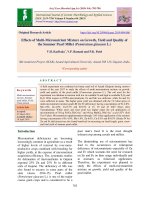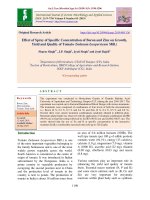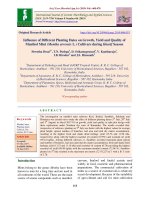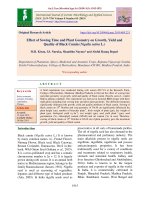Studies on the influence of seed pelleting on seed yield and quality in French bean (Phaseolus vulgaris L.) cv. “Arka Anoop”
Bạn đang xem bản rút gọn của tài liệu. Xem và tải ngay bản đầy đủ của tài liệu tại đây (204.77 KB, 7 trang )
Int.J.Curr.Microbiol.App.Sci (2017) 6(5): 1912-1918
International Journal of Current Microbiology and Applied Sciences
ISSN: 2319-7706 Volume 6 Number 5 (2017) pp. 1912-1918
Journal homepage:
Original Research Article
/>
Studies on the Influence of Seed Pelleting on Seed Yield and
Quality in French Bean (Phaseolus vulgaris L.) cv. “Arka Anoop”
K. Chaya Devi*, P. Balakrishna and J. Chandraprakash
Department of Seed Science and Technology, University of Agricultural Sciences,
GKVK, Bangalore - 65, India
*Corresponding author
ABSTRACT
Keywords
French bean seeds,
chemicals,
botanicals,
pelleting, seed
yield, seed quality.
Article Info
Accepted:
17 April 2017
Available Online:
10 May 2017
A field experiment was conducted during rabi, 2013 at Department of Horticulture, UAS,
GKVK, Bangalore to understand the influence of seed pelleting on seed yield and quality
of french bean cv. Arka Anoop. The experiment consists of eight treatments with seed
pelleting viz., T1(control), T2 (seed pelleting with clay + Gypsum (1:1), T3 (seed pelleting
with clay +Neem leaf powder + Gypsum (1:1:1), T4 (seed pelleting with biofertilizers
(Rhizobium) @ 30 g/kg), T5 (seed pelleting with ZnSO4 @ 3g/kg), T6 (seed pelleting with
Borax @ 3g /kg), T 7 (seed pelleting with Capton (2.5g/kg) + Imidacloprid (2.5g/kg) and
T8 (seed pelleting with ZnSO4 @ 3g/kg + borax @ 3g/kg + Capton (2.5g/kg) +
Imidacloprid (2.5g/kg) and laid out in RCBD design with three replications. The
experimental results indicated the superiority of seed pelleting with ZnSO4 @ 3g/kg +
borax @ 3g/kg + Capton (2.5g/kg) + Imidacloprid (2.5g/kg) as compared to all other
treatments including unpelleted control. Data on seed yield and quality parameters such as
number of seeds per pod (5.33), seed yield per plant (24.47g), seed yield per plot (513.8g),
seed yield per hectare (28.54q), seed index (36.39g), germination (99.00%), root length
(22.83cm), shoot length (12.36cm), root and shoot ratio (0.540), seedling length
(35.20cm), seedling dry weight (248.83mg), seedling vigour index-I (3484), seedling
vigour index-II (2463), lower electrical conductivity (1.16dScm-1), pH of seed leachate
(6.96) and total dehydrogenase activity (2.77) was maximum in seed pelleted with ZnSO4
@ 3g/kg + borax @ 3g/kg + Capton (2.5g/kg) + Imidacloprid (2.5g/kg) compared to
control.
Introduction
French bean (Phaseolus vulgaris L.) is one of
the most important vegetable pulse crop
which is native to new world probably Central
Mexico which belongs to family Fabaceae is
a nutritious vegetable consumed as tender
pods, shelled beans and dry beans. It has
many synonyms like Snap bean, Kidney bean,
Haricot bean and also called Rajmash in
Hindi. It possess some medicinal properties
which is useful in controlling diabetics and
certain cardiac problems and it is a good
natural cure for bladder burn. It has both
carminative and reparative properties against
constipation and diarrhoea (Duke, 1981).
Seed pelleting is the process of enclosing a
seed with small quantity of inert material just
large enough to produce globular unit of
standard size to facilitate precision planting.
The inherent material creates natural water
1912
Int.J.Curr.Microbiol.App.Sci (2017) 6(5): 1912-1918
holding media and provides small amount of
nutrients to young seedlings. It also reduces
the problem of thinning, gap filling and
chemicals required in low quantity. Keeping
in view the experiment is followed to know
the outcome of the seed pelleting on seed
yield and quality.
Materials and Methods
The experiment was conducted during rabi,
2013 at Department of Horticulture,
University of Agricultural Sciences, GKVK,
Bangalore. The experiment was laid out in
randomized complete block design with eight
treatments replicated thrice. The french bean
seeds were pelleted with T1(control), T2 (seed
pelleting with clay + Gypsum (1:1), T3 (seed
pelleting with clay +Neem leaf powder +
Gypsum (1:1:1), T4 (seed pelleting with
biofertilizers (Rhizobium) @ 30 g/kg),
T5 (seed pelleting with ZnSO4 @ 3 g/kg),
T6 (seed pelleting with Borax @ 3g /kg),
T7 (seed pelleting with Capton (2.5g/kg) +
Imidacloprid (2.5g/kg) and T8 (seed pelleting
with ZnSO4 @ 3g/kg + borax @ 3g/kg +
Capton (2.5g/kg) + Imidacloprid (2.5g/kg).
The spacing of 30 x 10 cm was followed with
net plot size of 1.2 x 1.5 m. All the
recommended cultural practices for French
bean crop were followed. Five normal plants
were selected randomly in the net plot area
and tagged with a label in each treatment to
record the observations.
The observation on number of seeds per pod,
seed yield per plant, seed yield per plot, seed
yield per hectare, seed index, germination,
root length, shoot length, root and shoot ratio,
mean seedling length, seedling dry weight,
seedling vigour index-I, seedling vigour
index-II, lower electrical conductivity, pH of
seed leachate, and total dehydrogenase
activity was recorded. The data was
statistically analysed and the results are
presented in table 1, 2 and 3.
Results and Discussion
The results on seed yield and quality as
influenced by the seed pelleting is significant
and discussed here with the seeds pelleted
with different chemicals and botanicals
recorded significantly higher number of seeds
per pod, seed yield per plant, seed yield per
plot, seed yield per hectare, seed index,
germination, root length, shoot length, root
and shoot ratio, seedling length, seedling dry
weight, seedling vigour index-I, seedling
vigour index-II, lower electrical conductivity,
pH of seed leachate, and total dehydrogenase
activity. Among the different pelleting
treatments, seeds pelleted with T8 (seed
pelleting with ZnSO4 @ 3g/kg + borax @
3g/kg + Capton (2.5g/kg) + Imidacloprid
(2.5g/kg) recorded significantly highest
number of seeds per pod (5.33), seed yield per
plant (24.47g), seed yield per plot (513.8g)
and seed yield per hectare (28.54q)
respectively over control which was due to
the involvement in sugar synthesis and its
efficient translocation for seed formation and
development (Berger, 1949; Shkolnik and
Abdurashitov,1958). Similar results with
boron were reported by Srimathi et al., (2001)
and Supreeta Angadi (2004) in soybean and
Masuthi (2005) in cowpea and Angumuthu
(1991) in miner millets. Zinc element is
involved in auxin metabolism, plays a pivotal
role in seed size and development. The
second phase of seed development requires
adequate amount of zinc dependent upon
auxin for seed development. Hence, in the
present study also maximum seed yield and
yield traits have been noticed with ZnSO4
seed pelleting treatments. Among pelleting
treatments ZnSO4 @ 3g/kg + borax @ 3g/kg
+ Capton (2.5g/kg) + Imidacloprid (2.5g/kg)
recorded highest seed index (36.39g),
germination (99.00%), root length (22.83cm),
shoot length (12.36cm), root and shoot ratio
(0.540), mean seedling length (35.20cm)
compared to control.
1913
Int.J.Curr.Microbiol.App.Sci (2017) 6(5): 1912-1918
Table.1 Influence of seed pelleting on seed yield parameters in French bean (Phaseolus vulgaris) cv. Arka Anoop during rabi, 2013
Number of seeds
per pod
Seed yield per
plant (g)
Seed yield per plot
(g)
Seed yield
per hectare
(q)
T1
3.33
17.42
366.0
20.32
T2
3.66
18.12
380.5
21.14
T3
4.00
19.13
401.7
22.31
T4
4.00
20.25
405.5
22.50
T5
5.00
22.15
465.1
25.84
T6
4.33
21.43
450.2
25.01
T7
5.00
22.95
481.1
26.72
T8
5.33
24.47
513.8
28.54
Grand mean
4.33
20.74
433.0
24.04
S. Em±
0.19
0.13
2.69
0.13
C.D (P=0.05)
0.58
0.41
8.61
0.41
CV (%)
7.76
9.15
10.98
11.28
Treatments
1914
Int.J.Curr.Microbiol.App.Sci (2017) 6(5): 1912-1918
Table.2 Influence of seed pelleting on seed quality parameters in French bean (Phaseolus vulgaris) cv. Arka Anoop during rabi, 2013
Seed
Index (g)
Germination
(%)
T1
29.04
95.66
Root
length
(cm)
16.50
T2
30.06
96.33
T3
30.65
T4
Shoot
length (cm)
Shoot and
Root ratio
Seedling length (cm)
7.73
0.470
24.23
16.86
8.23
0.486
25.10
97.00
17.56
8.70
0.496
26.26
32.84
97.66
18.30
9.10
0.496
27.40
T5
34.57
98.66
20.56
10.46
0.510
31.03
T6
33.36
98.33
19.13
9.60
0.503
28.73
T7
35.30
98.66
21.80
11.26
0.516
33.06
T8
36.39
99.00
22.83
12.36
0.540
35.20
Grand mean
32.77
97.66
19.19
9.68
0.502
28.87
S. Em±
0.32
0.30
0.23
0.19
0.009
0.34
C.D (P=0.05)
0.98
0.93
0.70
0.60
0.029
1.04
CV (%)
1.71
0.54
2.08
3.54
3.335
2.06
Treatments
1915
Int.J.Curr.Microbiol.App.Sci (2017) 6(5): 1912-1918
Table.3 Influence of seed pelleting on seed quality parameters in French bean (Phaseolus vulgaris) cv. Arka Anoop during rabi, 2013
2318
Seedling
vigour
Index-II
1657
Electrical
Conductivity
(dSm-1)
1.53
181.50
2418
1748
T3
191.66
2548
T4
200.63
T5
Seedling dry
weight (mg)
Seedling
vigour Index-I
pH of seed
leachate
Total Dehydrogenase
Activity
T1
173.20
6.56
2.65
T2
1.48
6.60
2.67
1859
1.43
6.70
2.68
2676
1959
1.39
6.76
2.70
222.06
3062
2191
1.28
6.86
2.75
T6
210.03
2826
2065
1.33
6.80
2.72
T7
236.60
3262
2334
1.21
6.90
2.76
T8
248.83
3484
2463
1.16
6.96
2.77
Grand mean
208.06
2824
2034
1.35
6.77
2.71
S. Em±
2.40
38.80
270.4
0.01
0.02
0.003
C.D (P=0.05)
7.30
117.69
820.4
0.04
0.07
0.009
CV (%)
2.00
2.37
2.30
1.75
0.64
0.204
Treatments
1916
Int.J.Curr.Microbiol.App.Sci (2017) 6(5): 1912-1918
The higher seed quality parameters are
positively related to seed development which
is reflected through size of seed and test
weight which in turn is dependent on efficient
synthesis, translocation and accumulation of
food metabolites such as proteins in
leguminous crops. Hence, higher seed quality
parameters observed with pelleting treatment
ZnSO4 @ 3g/kg + borax @ 3g/kg + Capton
(2.5g/kg) + Imidacloprid (2.5g/kg) may be
due to their efficient role in sinksource
relationship. Seed with higher initial capital
food reserves always showed higher and rapid
germination which is also true in the present
study. Similar results were also reported by
Balaji (1990), Supreeta angadi (2004) in
soybean and Masuthi (2005) in cowpea.
Among pelleting treatments ZnSO4 @ 3g/kg
+ borax @ 3g/kg + Capton (2.5g/kg) +
Imidacloprid (2.5g/kg) pelleted seeds
recorded highest seedling dry weight
(248.83mg), seedling vigour index-I (3484),
seedling vigour index-II (2463), lower
electrical conductivity (1.16dScm-1), pH of
seed leachate (6.96) and total dehydrogenase
activity (2.77) over control.
The higher seedling vigour parameters which
were recorded, may be due to the fact that
well developed high quality seeds with higher
test weight shall have higher germination
potential and seedlings growth will be
vigorous with higher root and shoot length.
The vigour index being the product of
germination and seedling length, it is also
higher with these pelleted seed treatment in
the present study. Similar beneficial influence
of seed pelleting treatments with ZnSO4 @
3g/kg + borax @ 3g/kg + Capton (2.5g/kg) +
Imidacloprid (2.5g/kg) may be ascribed to
their role in enhanced metabolic activity,
earliness in germination, cell division and
elongation leading to production of increased
seedling growth in soybean (Balaji, 1990;
Supreeta Angadi, 2004; Rathinavel et al.,
2000; Masuthi, 2005). As zinc is the
constituent of several dehydrogenase enzyme
and an activator of other enzymes, which
might have triggered the germination and
seedling growth (Jeyabal et al., 1999). Hence
the study can be concluded seed pelleted with
(T8) ZnSO4 @ 3g/kg + borax @ 3g/kg +
Capton (2.5g/kg) + Imidacloprid (2.5g/kg)
could be recommended for the French bean
cultivation to harvest higher seed yield and
seed quality.
References
Angumuthu, R., 1991, Studies on seed
pelleting,
physiological
maturity,
sowing quality and storage of small
millets. M.Sc. (Agri.) Thesis, Tamilnadu
Agric. Univ., Coimbatore.
Balaji, D.S., 1990, Studies on the seed soil
relationship in certain crops paddy,
greengram,
soybean,
redgram,
sunflower, groundnut and cotton. M. Sc.
(Agri.) Thesis, Tamil Nadu Agric.
Univ., Coimbatore, India.
Berger, K.C., 1949. Boron in soils and crops.
Adv. in Agron., 1: 321-351.
Duke, J. A., 1981, Handbook of legumes of
world economic importance. New York,
USA/ London, UK: pp, 195-200.
Jeyabal, A. and Kuppuswamy, G., 1999,
Effect of nutrient coating on seedling
vigour, nutrient uptake and yield of rice
(Oryza sativa L.). Indian J. Agron., 44
(2): 304-309.
Masuthi, D. A., 2005, Effect of phosphorous,
zinc and boron on fruit set, seed yield
and quality of vegetable cowpea (Vigna
anguiculata (L.). M.Sc. (Agri) Thesis,
Univ. Agric. Sci., Dharwad, Karnataka
(India).
Rathinavel, K. and Dharmalingam, C., 1999,
Effect of seed pelleting on elite seedling
production in cotton cv. MCU7
(Gossypium hirsutum L.). Crop Res., 18
(1): 137- 141.
1917
Int.J.Curr.Microbiol.App.Sci (2017) 6(5): 1912-1918
Shkolnik and Abdurashitov, S.A., 1958,
Influence of micro-elements on
synthesis
and
translocation
of
carbohydrates. Pl. Phy., USSR, 5 (5):
393-399.
Srimathi, P., Sastri, G. and Malarkodi, K.,
2001, Influence of seed pelleting on
crop establish of soybean. Nat.Symp. on
Pulse and Seeds held at Coimbatore, pp.
107.
Supreetha Angadi, 2004, Effect of seed
pelleting on field performance and
storability in soybean (Glycine max (L.)
Merrill). M.Sc. (Agri) Thesis, Univ. of
Agric. Sci., Dharwad, Karnataka, India.
How to cite this article:
K. Chaya Devi, P. Balakrishna and J. Chandraprakash. 2017. Studies on the Influence of Seed
Pelleting on Seed Yield and Quality in French Bean (Phaseolus vulgaris L.) cv. “Arka Anoop”.
Int.J.Curr.Microbiol.App.Sci. 6(5): 1912-1918. doi: />
1918
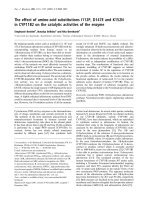
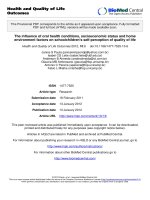
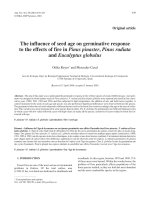
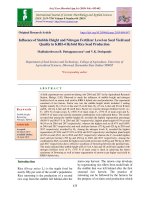
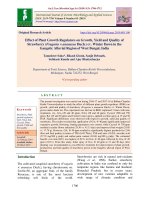
![Heterosis studies for seed yield and earliness in intra-specific hybrids of ricebean [Vigna umbellata (Thunb.) ohwi and ohashi] an under utilized pulse](https://media.store123doc.com/images/document/2020_01/09/medium_pxu1578554402.jpg)
